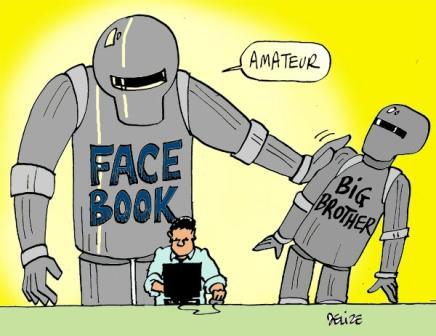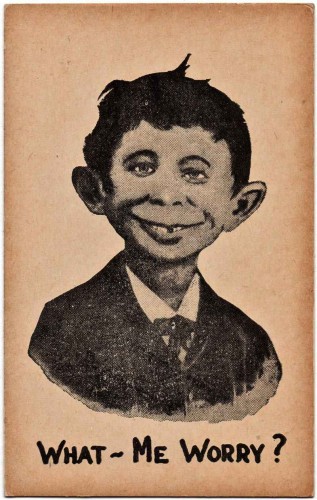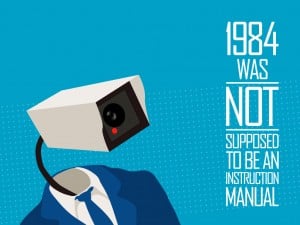
photos via powayusd
Online privacy is an illusion; anything you wouldn’t want your boss, friends, relatives, present or future significant others (or anyone else important to you) to see should never be posted, texted, emailed, tweeted, or liked. And now it appears that our own government is the party most interested in our social connections and interactions. How bothered should we be?
I began writing reviews on the internet in 1999, and at that time I accepted that a certain loss of privacy came with the territory. I have lived my online life as transparently as possible, because I believed that I had nothing to hide online or offline. In other words, I have felt that “because I am doing nothing wrong, I have nothing to worry about.” I am not a terrorist, a terrorist sympathizer, an anarchist, or a bad person … so why should I worry?
And yet, how could it not bother me to learn that since 2010 the NSA has been exploiting its “huge collections of data to create sophisticated graphs of some Americans’ social connections that can identify their associates, their locations at certain times, their traveling companions and other personal information, according to newly disclosed documents and interviews with officials.”
In other words, all of the information that we freely share every time we check into Foursquare, plan a trip on TripIt, update our LinkedIn profile, Tweet something, post on Facebook, share on G+, upload to Instagram, etc., etc., is fair game. And anything that someone else posts about with a tag leading back to us is as well.
The agency can augment the communications data with material from public, commercial and other sources, including bank codes, insurance information, Facebook profiles, passenger manifests, voter registration rolls and GPS location information, as well as property records and unspecified tax data, according to the documents.
At the risk of sounding paranoid, I’m starting to think that we are being trained to share, even to overshare, and by doing so, we are making the government’s collection of information that much easier.
Sure, one of the obvious uses for these social networks are to allow us to stay in contact to Aunt Zelda who lives across the country, or to catch up with our college friends that we had lost touch with years ago and then found again … but our innocent babbling on these sites also gives the government an implicit invitation to listen in on our unguarded thoughts and movements. This something we should be more concerned about, right?
In 1979 there was a Supreme Court ruling “that Americans could have no expectation of privacy about what numbers they had called.” That was the beginning.
Based on that ruling, the Justice Department and the Pentagon decided that it was permissible to create contact chains using Americans’ “metadata,” which includes the timing, location and other details of calls and e-mails, but not their content.
Phone and e-mail logs, for example, allow analysts to identify people’s friends and associates, detect where they were at a certain time, acquire clues to religious or political affiliations, and pick up sensitive information like regular calls to a psychiatrist’s office, late-night messages to an extramarital partner or exchanges with a fellow plotter.
It all sounds a bit Orwellian to me, and I have to admit that it makes me want to be a lot more careful about what I share with anyone … and then, once again, I shrug my shoulders and remind myself that I am a good person, and I have nothing to hide. Yet it would be naive of me to think that of the thousands of people I am connected to via social media, there isn’t a single person that I know, follow, or who follows me that might not have something to hide.
Every time something about the ways we are being tracked and monitored comes up, I again feel … violated. According to the First Amendment,
Congress shall make no law respecting an establishment of religion, or prohibiting the free exercise thereof; or abridging the freedom of speech, or of the press; or the right of the people peaceably to assemble, and to petition the Government for a redress of grievances.
But I feel like the Miranda Warning has become the unwritten amendment to this amendment:
- You have the right to remain silent.
- Anything you say can and will be used against you in a court of law.
As much as my ego would like to argue otherwise, I am no one special. I can’t think of any reason the government would want to watch me, follow me, track me, or pursue me. And yet … why wouldn’t they? I am giving them access to myself and my entire social network simply by being on social media. The idea of this is really starting to freak me out. What about you?



I don’t think that the government is training us to overshare – they are just taking advantage of the fact that we all do this. If anybody has an incentive for oversharing, it’s the services like Facebook, Foursquare, Twitter, Google, etc., that give us the tools to do this, and their incentive is their own revenue.
Government collection of data seems more a violation of the fourth amendment’s protection against unreasonable search and seizure than the first amendment’s right to speak freely. We all should especially worry if somebody whose activity has piqued the interest of the government, for whatever reason, should happen to dial our phones accidentally, or we dial their phones accidentally. Does an accidental misdial subject us to unreasonable data collection? How about our contacts? Do they suddenly become part of a circle of interest based on an accidental contact?
Will terrorist rings figure this out and then just start randomly contacting people by email, voice and text message, in order to make our government’s security services widen their nets of collection unnecessarily?
Taking advantage is totally right. =P
Good point about the 4th amendment.
And yeah, if accidental contact is all it takes to set things in motion, things could get hairy
I never answered the question, did I?
Yes, it bothers me. I’d prefer the government obtain a warrant before they start collecting data about me. I’d prefer that the process for obtaining the warrant have real, powerful, advocacy, though not necessarily non-secret. However, I think that warrants obtained by the court become part of a public record after a reasonable amount of time – 8 years, whatever. And, yes, I understand that there is a risk that an incident could occur domestically or to Americans internationally that could possibly have been prevented by complete data collection – I don’t care. Obviously, this data collection program did not prevent the bombs placed at the Boston marathon, nor the failed car bomb in Times Square a few years ago. If this sort of data collection cannot give us 100% security, I’d prefer something that doesn’t violate the rights that our system of government so dearly fought for and protected for two centuries.
Great topic, well written and thought-out.
Thank you! And I truly enjoyed your thoughtful comments.
Unfortunately companies giving the government access to our data wont stop unless we as citizens do something about it. For instance we all love Facebook but if we want them to stop sharing our data we need to delete our accounts. I’m sure a publicly traded companies wont want to have plummeting stocks. The problem is that we as a society never pull together to stop injustices such as this either because they don’t want to cause waves or are scared to act.
Our constitutional right to privacy exists for a reason. We can hope that we are not “bad” enough to merit scrutiny or that we “have nothing to hide” and hope that spares us, and we can hope that our government is truly only interested in this information for security purposes, but we are dependent on the government to always be good and not take advantage of that power, and that our definition of what meets a “security” need will always be that of the powers that be. That’s not a gamble I want to make, as an American citizen. Things can always change. I don’t want to cede my 4th amendment rights over to this enormous entity called the government and hope that it remains benevolent.
The difficult part about this situation is that once you give power away, it’s very difficult to get it back. I don’t want to wait until the NSA and the US government overreaches and infringes (more) on its citizens rights to say, “this has to stop!” It should be now.